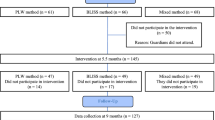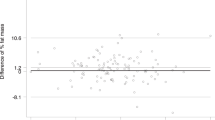Abstract
Purpose
This study aimed to assess the agreement in EBF between maternal recall and the dose-to-mother (DTM) technique.
Methods
Indonesia, Malaysia, Mongolia, Pakistan, Sri Lanka, Thailand, and Vietnam participated in the study. A total of 207 and 118 mother-infant pairs were assessed at 3 and 6 months of child’s age. Using a standardized questionnaire, mothers were asked to recall child feeding during the previous 24 h, at 3 and 6 months. Those recalled to be EBF proceeded to be assessed using DTM technique. Non-milk oral intake (NMOI) cutoff of 86.6 g/d was used to classify EBF.
Results
According to DTM, 66% of infants were EBF at 3 months, while only 22% were EBF at 6 months. At 3 months, the overall % agreement between maternal recall and DTM method was 68%, kappa 0.06 (95% CI: 0.07–0.20), and at 6 months, the % agreement was only 21%, kappa -0.031 (95% CI -0.168 to 0.107). Human milk intakes were similar at 3 months and 6 months when expressed as g/d, but decreased when expressed as g/kg/d, with a large variation within and between countries; Pakistan being the lowest.
Conclusion
This study showed there were declining levels of EBF from 3 to 6 months in the participating countries from Asia and the agreement between maternal recall and DTM technique to classify EBF was low. To ensure that the DTM technique can be more widely used in evaluating breastfeeding promotion programs, consensus on the appropriate NMOI cutoff and simplification of the DTM protocol is necessary.
This is a preview of subscription content, access via your institution
Access options
Subscribe to this journal
Receive 12 print issues and online access
$259.00 per year
only $21.58 per issue
Buy this article
- Purchase on Springer Link
- Instant access to full article PDF
Prices may be subject to local taxes which are calculated during checkout

Similar content being viewed by others
Data availability
Data generated from this study are deposited at the IAEA repository on human milk intakes and can be available upon request.
References
FAO, UNICEF, WFP, WHO (2021) Asia and the Pacific regional overview of food security and nutrition 2020: Maternal and child diets at the heart of improving nutrition. Bangkok: FAO
UNICEF/WHO/World Bank Group – Joint Child Malnutrition Estimates (2021) Levels and trends in child malnutrition. Geneva: World Health Organization
Hawkes C, Ruel MT, Salm L, Sinclair B, Branca F. Double-duty actions: seizing programme and policy opportunities to address malnutrition in all its forms. Lancet. 2020;395:142–55. https://doi.org/10.1016/S0140-6736(19)32506-1
Lee MK, Binns C (2019) Breastfeeding and the risk of infant illness in Asia: A Review. Int J Environ Res Public Health 17. https://doi.org/10.3390/ijerph17010186
Saeed OB, Haile ZT, Chertok IA (2020) Association between exclusive breastfeeding and infant health outcomes in Pakistan. J Pediatr Nurs. 50:e62-e8. https://doi.org/10.1016/j.pedn.2019.12.004
Krawczyk A, Lewis MG, Venkatesh BT, Nair SN. Effect of exclusive breastfeeding on rotavirus infection among children. Indian J Pediatr. 2016;83:220–5. https://doi.org/10.1007/s12098-015-1854-8
Horta BL, Loret de Mola C, Victora CG. Long-term consequences of breastfeeding on cholesterol, obesity, systolic blood pressure and type 2 diabetes: a systematic review and meta-analysis. Acta Paediatr. 2015;104:30–7. https://doi.org/10.1111/apa.13133
Nguyen B, Jin K, Ding D. Breastfeeding and maternal cardiovascular risk factors and outcomes: a systematic review. PLoS ONE. 2017;12:e0187923 https://doi.org/10.1371/journal.pone.0187923
Chowdhury R, Sinha B, Sankar MJ, Taneja S, Bhandari N, Rollins N, et al. Breastfeeding and maternal health outcomes: a systematic review and meta-analysis. Acta Paediatr. 2015;104:96–113. https://doi.org/10.1111/apa.13102
Zong X, Wu H, Zhao M, Magnussen CG, Xi B. Global prevalence of WHO infant feeding practices in 57 LMICs in 2010-2018 and time trends since 2000 for 44 LMICs. EClinicalMedicine. 2021;37:100971 https://doi.org/10.1016/j.eclinm.2021.100971
IAEA (2010) IAEA human health series no. 7: stable isotope technique to assess intake of human milk in breastfed infants. Vienna: International Atomic Energy Agency.
Samuel TM, Thomas T, Bhat S, Kurpad AV. Are infants born in baby-friendly hospitals being exclusively breastfed until 6 months of age? Eur J Clin Nutr. 2012;66:459–65. https://doi.org/10.1038/ejcn.2011.179
Medoua GN, Sajo Nana EC, Ndzana AC, Makamto CS, Etame LS, Rikong HA, et al. Breastfeeding practices of Cameroonian mothers determined by dietary recall since birth and the dose-to-the-mother deuterium-oxide turnover technique. Matern Child Nutr. 2012;8:330–9. https://doi.org/10.1111/j.1740-8709.2011.00293.x
Motswagole, Matenge STP, Mongwaketse T, Bogopa J, Kobue-Lekalake R, Mosetlha K, Kwape L. Application of the deuterium-oxide dose-to-mother technique to determine the exclusivity of breastfeeding in women in Kanye, Botswana. S Afr J Clin Nutr. 2015;23:128–33.
Mazariegos M, Slater C, Ramirez-Zea M. Validity of Guatemalan mother’s self-reported breast-feeding practices of 3-month-old infants. Food Nutr Bull. 2016;37:494–503. https://doi.org/10.1177/0379572116654644
World Health Organization and the United Nations Children’s Fund (UNICEF) (2021) Indicators for assessing infant and young child feeding practices: definitions and measurement methods. Geneva: World Health Organization and the United Nations Children’s Fund (UNICEF).
Liu Z, Diana A, Slater C, Gibson RS, Houghton L, Duffull SB. Development of a nonlinear hierarchical model to describe the disposition of deuterium in mother-infant pairs to assess exclusive breastfeeding practice. J Pharmacokinet Pharmacodyn. 2019;46:1–13. https://doi.org/10.1007/s10928-018-9613-x
Tongchom W, Pongcharoen T, Judprasong K, Udomkesmalee E, Kriengsinyos W, Winichagoon P. Human milk intake of Thai breastfed infants during the first 6 months using the dose-to-mother deuterium dilution method. Food Nutr Bull. 2020;41:343–54. https://doi.org/10.1177/0379572120943092
Moore SE, Prentice AM, Coward WA, Wright A, Frongillo EA, Fulford AJ, et al. Use of stable-isotope techniques to validate infant feeding practices reported by Bangladeshi women receiving breastfeeding counseling. Am J Clin Nutr. 2007;85:1075–82. https://doi.org/10.1093/ajcn/85.4.1075
Mulol H, Coutsoudis A. Limitations of maternal recall for measuring exclusive breastfeeding rates in South African mothers. Int Breastfeed J. 2018;13:19 https://doi.org/10.1186/s13006-018-0159-8
Whyte S, McLean-Smith J, Reid M. Concordance of the deuterium dose to mother method and 24-hour recall to measure exclusive breastfeeding at 6 weeks postnatally in rural/urban setting in Jamaica. Matern Child Health J. 2022;26:2126–36. https://doi.org/10.1007/s10995-022-03465-8
Rios-Leyvraz M & Yao Q. The volume of breast milk intake in infants and young children: a systematic review and meta-analysis. Breastfeeding Med. 2023:18. https://doi.org/10.1089/bfm.2022.0281
Liu Z, Diana A, Slater C, Preston T, Gibson RS, Houghton L, et al. Development of a parsimonious design for optimal classification of exclusive breastfeeding. CPT Pharmacomet Syst Pharm. 2019;8:596–605. https://doi.org/10.1002/psp4.12428
Acknowledgements
We would like to express gratitude to the International Atomic Energy Agency (IAEA) for providing technical support (Technical Cooperation RAS6073) and supplies for the study. This work was also supported, in part, by the national funding for participating countries. IAEA participated in the design, management, analysis, interpretation, preparation, review, and approval of the manuscript.
Author information
Authors and Affiliations
Contributions
PW, TP, CS, AJMA conceived the study and led the planning of the study protocol with inputs from country authors and MI; TP, TF, EW, NK, EP, TA, AY, MH, KJ, NTT, HVTT conducted field data, sample collection, and sample analysis; TT performed statistical analysis; PW drafted the first draft of the manuscript with inputs and approval of final manuscript from all authors.
Corresponding author
Ethics declarations
Competing interests
Pattanee Winichagoon, Tippawan Pongcharoen, Tetra Fadjarwati, Ermin Winarno, Norima A Karim, Enkhzul Purevsuren, Tanvir Ahmad, Ayesha Yameen, Manjula Hettiarachchi, Kunchit Judprasong, Nga Tran Thuy, Hien Vu Thi Thu, Munirul Islam, Christine Slater, Tinku Thomas, and Alexia J Murphy-Alford, confirmed no conflicts of interest.
Ethical approval
This study was conducted according to the guidelines laid down in the Declaration of Helsinki. The approval for the study in the country was obtained from the Ethical Review Committee in each country by the respective lead authors and other administrative approvals were also their responsibility.
Additional information
Publisher’s note Springer Nature remains neutral with regard to jurisdictional claims in published maps and institutional affiliations.
Rights and permissions
Springer Nature or its licensor (e.g. a society or other partner) holds exclusive rights to this article under a publishing agreement with the author(s) or other rightsholder(s); author self-archiving of the accepted manuscript version of this article is solely governed by the terms of such publishing agreement and applicable law.
About this article
Cite this article
Winichagoon, P., Pongcharoen, T., Fadjarwati, T. et al. Discordance in exclusive breastfeeding between maternal recall and deuterium dose-to-mother technique during the first 6 months of infants: A multi-country study in Asia. Eur J Clin Nutr 78, 135–140 (2024). https://doi.org/10.1038/s41430-023-01353-0
Received:
Revised:
Accepted:
Published:
Issue Date:
DOI: https://doi.org/10.1038/s41430-023-01353-0



